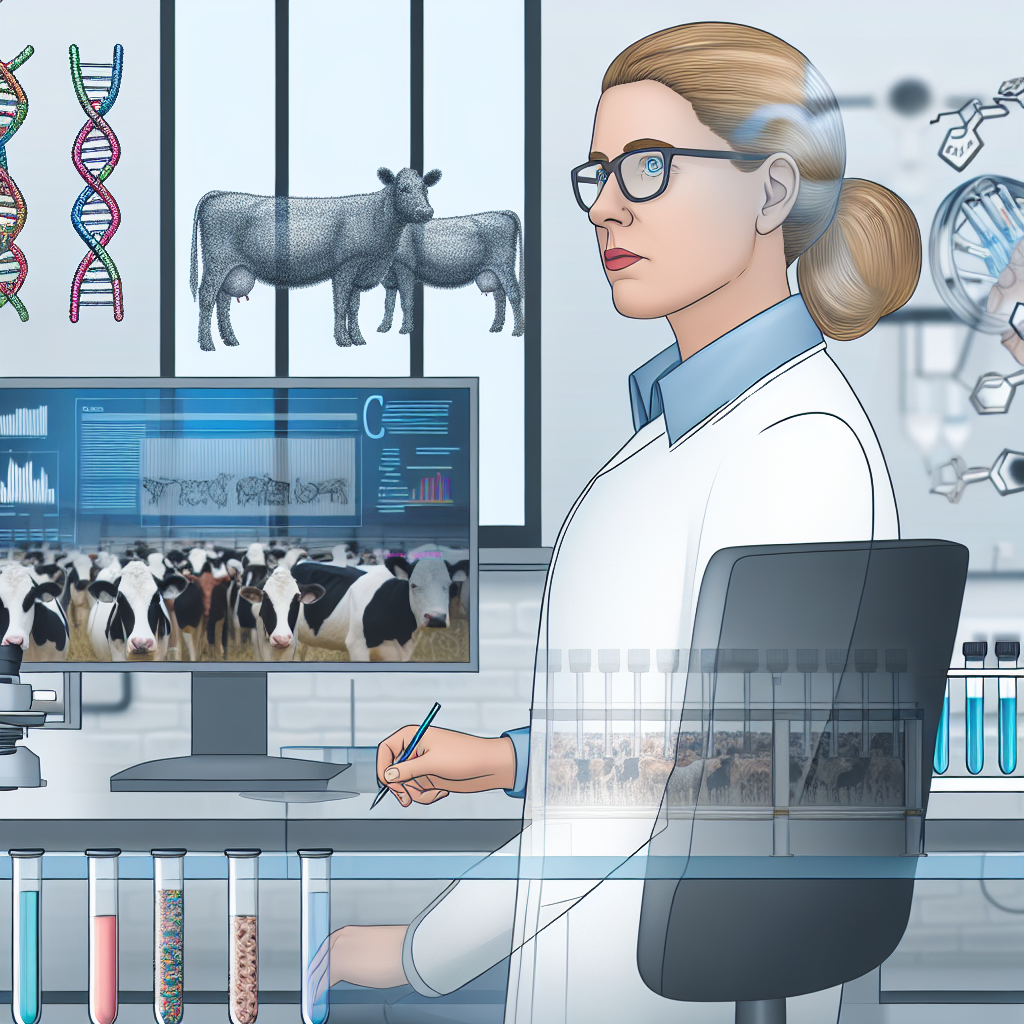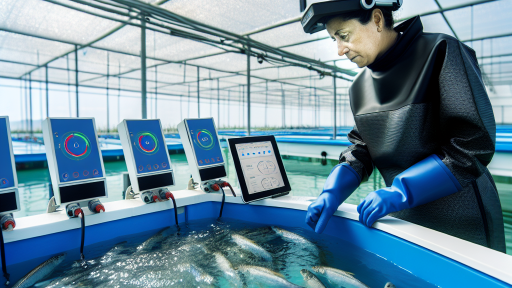Introduction to Genetic Diseases in Livestock
Genetic diseases pose significant challenges in livestock production.
Understanding these diseases helps improve animal health and farm productivity.
Genetic disorders can lead to severe economic losses for farmers.
Consequently, prevention strategies become crucial in livestock management.
Overview of Genetic Diseases
Genetic diseases arise from mutations in an animal’s DNA.
These mutations can be inherited from one or both parents.
Common genetic conditions include hip dysplasia and inherited myopathy.
Additionally, some diseases may affect specific breeds more than others.
Importance of Addressing Genetic Diseases
Addressing genetic disorders is vital for animal welfare.
Healthy livestock contribute to greater productivity on farms.
Furthermore, reducing disease prevalence enhances genetic diversity.
Farmers can improve overall herd quality through effective breeding programs.
Consequences of Neglecting Genetic Health
Neglecting genetic health leads to increased veterinary costs.
Livestock suffering from genetic diseases may require extensive treatments.
Moreover, such diseases can lower reproductive performance significantly.
Transform Your Agribusiness
Unlock your farm's potential with expert advice tailored to your needs. Get actionable steps that drive real results.
Get StartedUltimately, this negligence harms the sustainability of farming operations.
Understanding the Genetic Basis of Diseases in Different Livestock Species
Overview of Genetic Diseases in Livestock
Genetic diseases affect the health and productivity of livestock species.
These conditions arise from mutations in specific genes.
They can lead to various health issues, reducing animal welfare.
Farmers need to understand these diseases for effective management.
Common Genetic Disorders
Many livestock species face unique genetic disorders.
For example, cattle are prone to bovine leukocyte adhesion deficiency.
This condition affects immune function, leading to higher disease susceptibility.
Similarly, pigs may suffer from porcine stress syndrome.
This disorder can cause sudden deaths under stress.
Therefore, recognizing these conditions is essential for farmers.
Role of Genetic Testing
Genetic testing plays a vital role in mitigating these diseases.
It allows for the identification of carriers of genetic disorders.
Farmers can use this information to make informed breeding decisions.
By selecting disease-free animals for breeding, farmers improve herd health.
Additionally, genetic tests can help prevent the propagation of harmful traits.
Importance of Genetic Diversity
Genetic diversity is crucial for livestock populations.
This diversity helps reduce the likelihood of genetic diseases.
Moreover, it enhances the adaptability of livestock to environmental changes.
Farmers can maintain diversity by avoiding inbreeding.
A diverse gene pool also contributes to overall herd resilience.
Managing Genetic Diseases
Several strategies exist for managing genetic diseases in livestock.
First, implementing rigorous breeding programs is essential.
Second, educating farmers about genetic health can lead to better practices.
Showcase Your Farming Business
Publish your professional farming services profile on our blog for a one-time fee of $200 and reach a dedicated audience of farmers and agribusiness owners.
Publish Your ProfileThird, collaboration with veterinary geneticists can improve outcomes.
Farmers should utilize available resources for genetic disease management.
These approaches contribute to healthier livestock and greater productivity.
Importance of Genetic Testing
Identifying Carrier Animals to Prevent Disease
Genetic testing plays a crucial role in livestock management.
Farmers and breeders can identify carrier animals effectively.
Carriers may not show symptoms but can pass diseases to descendants.
This testing reduces the risk of genetic diseases in herds.
By detecting carriers early, breeders can make informed decisions.
They can choose to pair non-carrier mates, thus preventing disease spread.
Moreover, genetic testing improves overall herd health.
Healthy animals contribute to better productivity and profitability.
Furthermore, it promotes genetic diversity within livestock populations.
Ultimately, this approach supports sustainable farming practices.
The Role of Genetic Testing Methods
Various genetic testing methods are available to breeders today.
These methods include DNA sequencing and marker-assisted selection.
DNA sequencing provides comprehensive information about genetic makeup.
Marker-assisted selection helps identify beneficial traits efficiently.
Choosing the right method depends on the specific needs of the farm.
Additionally, consulting with genetic specialists can provide guidance.
Implementing Genetic Testing on the Farm
Farmers should establish a routine genetic testing schedule.
This schedule should include testing newly acquired or breeding livestock.
It is essential to educate staff about the importance of these tests.
Training ensures everyone understands how to manage and interpret results.
Implementing a record-keeping system for test results is also vital.
Such a system enables easy tracking of carrier status over time.
Consistent monitoring allows for timely adjustments in breeding strategies.
As a result, farmers can maintain a healthier livestock population.
Economic Benefits of Genetic Testing
Genetic testing ultimately leads to lower veterinary costs.
Preventing genetic diseases saves money for farmers in the long run.
Additionally, healthier livestock can produce more milk or meat.
This increase in productivity enhances overall farm income.
Moreover, consumers often favor meat and dairy from healthy livestock.
Thus, genetic testing can improve marketability and sales opportunities.
Explore Further: Developing Genetic Improvement Plans for Livestock
Breeding Strategies: Using Selective Breeding to Enhance Genetic Health
Importance of Selective Breeding
Selective breeding improves genetic health in livestock.
This method targets desirable traits for enhancement.
It reduces the prevalence of genetic diseases significantly.
Benefits include increased productivity and better animal welfare.
Processes of Selective Breeding
Identifying superior animals is the first step.
Producers evaluate animals based on health and performance.
Showcase Your Farming Business
Publish your professional farming services profile on our blog for a one-time fee of $200 and reach a dedicated audience of farmers and agribusiness owners.
Publish Your ProfileAfter identifying potential candidates, successful traits are chosen.
Next, these animals are mated to produce the desired offspring.
This cycle is repeated over multiple generations.
Data Collection and Analysis
Accurate data collection is vital in selective breeding.
Producers must track genetic information for each animal.
Tools such as pedigree analysis help identify valuable traits.
Moreover, genetic testing reveals important health information.
Collaboration with Geneticists
Working with geneticists enhances breeding strategies.
They offer insights into genetic variation and inheritance.
Their expertise aids in minimizing genetic disorders.
Additionally, they can assist in developing breeding programs.
Challenges of Selective Breeding
One major challenge involves genetic diversity.
Overemphasis on specific traits may reduce genetic variability.
This loss can lead to increased susceptibility to diseases.
Hence, maintaining a balanced breeding strategy is essential.
Monitoring Genetic Diversity
Producers should regularly assess the genetic diversity of their livestock.
Using genetic markers can provide insights into diversity levels.
Programs should include animals from various genetic backgrounds.
This approach ensures long-term health and resilience.
Ethical Considerations in Breeding
Ethics play a crucial role in selective breeding practices.
Producers must prioritize animal welfare in their decisions.
Additionally, it is essential to avoid inbreeding.
Maintaining health and well-being should lead breeding choices.
Future Directions in Selective Breeding
Innovation in technology continues to shape breeding methods.
Genomic selection allows for more precise breeding decisions.
It utilizes DNA information to enhance desired traits effectively.
This technology improves efficiency and accuracy in breeding.
Integrating Biotechnology
Biotechnology offers new tools for livestock breeding.
Techniques such as gene editing can enhance genetic traits safely.
By incorporating these methods, producers can prevent genetic diseases more effectively.
Collaboration Across the Industry
Collaboration among breeders, researchers, and producers fosters better outcomes.
Sharing knowledge and resources leads to more effective strategies.
Collective efforts can enhance livestock health and productivity.
This teamwork establishes a sustainable future for livestock farming.
Learn More: Economic Benefits of Investing in Fish Farming
The Role of Genetic Editing Technologies: CRISPR and Beyond
Introduction to Genetic Editing in Livestock
Genetic editing plays a pivotal role in modern livestock management.
It helps reduce the prevalence of genetic diseases.
Moreover, advanced technologies aim to enhance animal welfare.
Understanding CRISPR Technology
CRISPR technology revolutionizes genetic engineering.
It allows precise modifications to DNA sequences.
Showcase Your Farming Business
Publish your professional farming services profile on our blog for a one-time fee of $200 and reach a dedicated audience of farmers and agribusiness owners.
Publish Your ProfileThis precision minimizes unintended changes that could arise from traditional methods.
Application of CRISPR in Livestock Breeding
Farmers use CRISPR to create disease-resistant breeds.
For instance, researchers are developing pigs resistant to Porcine Reproductive and Respiratory Syndrome.
Such innovations can drastically reduce the need for antibiotics.
Other Genetic Editing Technologies
Beyond CRISPR, several technologies assist in genetic modification.
For example, TALENs and ZFNs offer alternative approaches to gene editing.
These technologies also provide unique benefits in livestock management.
Ethical Considerations in Genetic Editing
The use of genetics in livestock raises ethical questions.
First, concerns about animal welfare emerge.
Second, potential ecological impacts require careful evaluation.
Addressing these issues is paramount for responsible genetic editing.
The Future of Genetic Editing in Livestock
As technology advances, the future looks promising for livestock genetics.
New methods may increase efficiency and further eliminate genetic diseases.
Ultimately, the aim is to create healthier livestock that contribute to sustainable farming.
Implications of Genetic Editing for Livestock Farming
Genetic editing technologies will likely transform livestock farming.
They hold the potential to achieve healthier, more resilient animals.
With responsible use, they can lead to significant advancements in agriculture.
You Might Also Like: Creating a Successful Breeding Program from Scratch
Implementing Herd Management Practices
Regular Health Monitoring
Regular health monitoring is crucial for livestock management.
It helps identify genetic diseases early in the herd.
Producers should establish a routine health check schedule.
Each animal’s health status must be documented thoroughly.
Utilizing veterinary services can enhance health assessments.
Additionally, vaccination programs must be strictly followed.
Health records allow for better decision-making regarding breeding.
Moreover, these records can help trace genetic issues over time.
Record Keeping
Comprehensive record keeping supports effective herd management.
Farmers should maintain accurate breeding records.
Each animal’s lineage helps prevent inbreeding.
Digital record-keeping systems can streamline this process.
These systems also make it easier to track health data.
All relevant information should be easily accessible to staff.
Moreover, regular audits of records can catch discrepancies.
Ultimately, good records aid in selecting the best breeding stock.
Utilizing Genetic Testing
Genetic testing provides valuable insights into livestock health.
This practice identifies animals carrying genetic disorders.
Producers can make informed breeding decisions based on results.
Including genetic testing as part of herd management enhances health.
Furthermore, it can reduce the incidence of inherited diseases.
Establishing a Comprehensive Herd Health Plan
Having a comprehensive health plan is essential for prevention.
Showcase Your Farming Business
Publish your professional farming services profile on our blog for a one-time fee of $200 and reach a dedicated audience of farmers and agribusiness owners.
Publish Your ProfileThis plan should include strategies for all aspects of herd health.
Regular training for staff improves health management effectiveness.
Consistent evaluation of the plan allows for necessary adjustments.
Ultimately, this approach promotes the long-term success of livestock operations.
See Related Content: Effective Feed Management Strategies for Aquaculture

Nutritional Requirements: How Proper Diet Can Influence Genetic Health
The Role of Nutrition in Genetic Expression
Nutrition directly affects genetic expression in livestock.
Essential nutrients support the proper functioning of genes.
For instance, proteins play a crucial role in growth and repair.
A balanced diet enhances overall health and vitality.
This, in turn, can reduce the manifestation of genetic disorders.
Vitamins and Minerals: Building Blocks for Genetic Integrity
Vitamins are vital for many biochemical processes.
Vitamin E, for example, acts as an antioxidant.
This protects cells from oxidative stress that can lead to genetic damage.
Additionally, minerals like selenium bolster immune function.
A well-rounded vitamin and mineral intake promotes resilience against diseases.
Impact of Fatty Acids on Genetic Health
Fatty acids are essential for cellular structure and function.
Omega-3 fatty acids offer anti-inflammatory properties.
This can enhance reproductive health and overall longevity.
Moreover, diets rich in omega-3s support healthy genetic expression.
Thus, incorporating proper fatty acids is crucial for livestock wellbeing.
Dietary Fiber: Supporting Gut Health and Gene Expression
Dietary fiber plays a significant role in digestive health.
A healthy gut microbiome enhances nutrient absorption.
This supports better overall health and genetic functionality.
Furthermore, fiber-rich diets can reduce the risk of metabolic disorders.
Consequently, maintaining optimal gut health is imperative for livestock.
Implementing Effective Feeding Strategies
Farmers must adopt effective feeding strategies to optimize nutrition.
Regularly assessing nutritional needs is vital for livestock health.
Formulating rations based on specific genetic lines can yield benefits.
Monitoring dietary intake helps prevent nutritional deficiencies.
Ultimately, a tailored feeding approach promotes genetic health and productivity.
Collaboration with Veterinary Geneticists
Importance of Professional Guidance
Veterinary geneticists provide essential expertise in livestock management.
They help in understanding genetic disease risks effectively.
Collaboration can lead to informed decision-making in breeding practices.
Moreover, it aids in enhancing the overall health of livestock populations.
Key Areas of Collaboration
Working with veterinary geneticists covers several key areas.
- Genetic testing and screening for diseases.
- Development of breeding programs to reduce genetic disorders.
- Training for producers in managing genetic health.
- Research on genetic traits that affect livestock health.
Establishing Partnerships
Establishing partnerships with veterinary geneticists is crucial.
Identify professionals with relevant experience in livestock genetics.
Networking at agricultural events can help find the right experts.
Additionally, local universities often have resources for collaboration.
Implementing Recommendations
Once partnerships are established, implementing their recommendations is vital.
Showcase Your Farming Business
Publish your professional farming services profile on our blog for a one-time fee of $200 and reach a dedicated audience of farmers and agribusiness owners.
Publish Your ProfileAdopt genetic testing protocols to identify potential issues early.
Use data-driven insights to select breeding stock wisely.
Furthermore, maintain open communication with geneticists for ongoing support.
The Future of Genetic Disease Prevention in Livestock Farming
Advancements in Genetic Technologies
Genetic technologies are rapidly evolving in livestock farming.
These advancements include gene editing techniques.
CRISPR-Cas9 is one of the most notable tools.
This tool allows precise alterations to genomic sequences.
Moreover, these technologies offer solutions for previously untreatable genetic disorders.
Implementation of Genomic Selection
Genomic selection significantly improves breeding programs.
It enables farmers to select animals with desired traits more effectively.
Consequently, this method reduces the prevalence of hereditary diseases.
Farmers can focus on healthier stock overall, enhancing productivity.
The Role of Collaboration
Collaboration among researchers, farmers, and geneticists is essential.
Pooling knowledge fosters innovations in genetic disease prevention.
Additionally, partnerships can facilitate field trials for new technologies.
Sharing resources also accelerates the pace of discovery.
Education and Awareness
Educating farmers about genetic disease prevention is key.
Workshops and seminars can enhance understanding of genetic tools.
This knowledge empowers farmers to make informed decisions.
Ultimately, awareness leads to better animal health management practices.
Regulatory Considerations
Regulatory frameworks must evolve alongside technological advancements.
Clear guidelines can facilitate the safe use of genetic technologies.
Furthermore, transparent regulations can build public trust in animal genetics.
Industry stakeholders should advocate for thoughtful policy development.
Promising Future for Livestock Health
The future of genetic disease prevention in livestock farming appears promising.
With continuous advancements, farmers can expect healthier livestock.
By embracing these changes, the industry can enhance sustainability.
A proactive approach will lead to lasting improvements in animal health.
Additional Resources
The Transformation of U.S. Livestock Agriculture: Scale, Efficiency …




